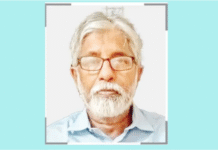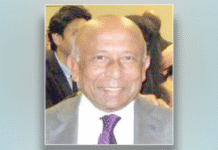 “I fundamentally believe that you don’t get rid of things by banning them. You defeat views by challenging them, by defeating them through ballot box because that’s the say of the people and that’s the most powerful form of democracy,” Senior Minister of State of Foreign Affairs Baroness Warsi said on Wednesday.
“I fundamentally believe that you don’t get rid of things by banning them. You defeat views by challenging them, by defeating them through ballot box because that’s the say of the people and that’s the most powerful form of democracy,” Senior Minister of State of Foreign Affairs Baroness Warsi said on Wednesday.
The Pakistani-origin politician was replying to a question at a press briefing about a ban on Jamaat-e-Islami, a demand that has been raised by the hundreds of thousands of youths at Shahbagh and supported by millions, due to its involvement in rapes and genocides during the War of Independence from Pakistan in 1971.
“There are always parties in all countries whose views we may not like, whose views people may not like and the way you defeat those views is through the ballot box,” she said.
The minister would not make any direct comment on the issue of a country’s politics, but gave ‘Britain’s general view about politics’.
Baroness Warsi said people can take to the streets to make their voice and views heard, but of course ‘in a peaceful way.’
“Britain’s view is that people have a right to take to the street in a peaceful protest. They can demand things, (be it the Shahbagh movement or other groups) that want to take to the street and make their views and voices heard as long as those views and voices are being raised in a peaceful way, where there is no violence,” she said.
“But these decisions are not made on the streets. These decisions ultimately have to be made by politicians and what I would say, at some point there, have to be a process to resolve the differences and that process is through democratically held elections,” the Conservative Party leader said.
During her three-day visit, she met with Prime Minister Sheikh Hasina, Leader of Opposition Khaleda Zia and Foreign Minister Dipu Moni, apart from visiting Sylhet, from where most Bangladeshis migrated to the UK, and the Rohingya camps in Cox’s Bazar.
Baroness Warsi declined to speculate on the upcoming elections in the wake of political impasse in Bangladesh.
She said her meetings with the both PM and opposition leader were ‘extremely productive.’
“There was a real commitment to democracy among them.”
She said the major parties realised that the upcoming election “presented an opportunity for Bangladesh to continue as a stable democracy as part of the commonwealth family” and stressed on participation of all parties in the election to consider it to be ‘legitimate’.
The Senior Minister also met with the Election Commission officials and termed their preparations for the general elections ‘extremely well.’
It was her first visit to Bangladesh after assuming the position in the foreign office on Sep 4 last year.
She left Dhaka Wednesday night. On the first day of her arrival, she officially opened the prime time visa arrangements in Dhaka that allow busy people to apply even on Saturdays.
The Conservative leader had been to Bangladesh in 2011 on her 40th birthday when Bangladesh, the fourth largest bilateral recipient of UK aid, was also celebrating its 40th anniversary of existence.
Source: bdnews24









